Five Questions with __________ is an experiment with flash interviews. The series on poets continues with poet, essayist, editor, professor, and political activist Juliana Spahr. Have you read her essay 'Metromania: Poetry, Academy, Anarchy'? (I searched high and low for it—at least two library archives carrying the journal in which it appeared skipped that publication year, and I surreptitiously started to give this omission greater meaning—so she has generously allowed me to set it free.) Published twelve years ago, 'Metromania' reflected on the institutionalized American literary establishment, the nature of creation and the larger social fabric, and financial subsidization (or lack thereof). It is as relevant as ever. To see just how relevant, I refer the reader to two places: (1) Spahr and Joshua Clover's jointly-written 'A Job Letter to the Poetry Foundation' (May 2012) nominating themselves for the organization's presidency on the grounds of 'a commitment to the fundamental virtue of a non-institutional poetry entangled in such doings of daily life,' their employment as '"professional" poets' making them 'uniquely qualified to recognize and condemn institutionalization [...] for others to avoid the insidious lure of market management, structural self-preservation, and the temptation to conjure the very sorts of careers in poetry or poetry administration that have crippled our own artistry'; and (2) Spahr's poetic voice in the second-person plural as it moves toward the first-person singular: 'The war on poverty was declared for Appalachia in 1964. / There was one in three in poverty. / There was the idea that a rising tide lifts all boats. / There were other signs of our being middle class, or so I was told. / This was the sort of thing that upper class people did. / We bought our own food without food stamps and we talked about how we did this a lot as a point of pride and distinction. / We lived in a country that was rich and the government had given the place where we lived a lot of aid starting in 1964 to pull it out of poverty. / We worried a lot about my father getting fired. / What calling myself middle class covers over' (from Well There Then Now, Black Sparrow Books, 2011).
Our human descendants—the ones who shall find the ectoskeletons of our ruins, and our language, should it survive in some form—what images would you most wish they see of us?
All the snapshots that have been uploaded to some social media site in the last few years.
Diana di Prima wrote in 'Fire Sale Everything Must Go!!!'
As for those other long failed or failing systems
Marx has to go & Lenin with him
Trotsky too let's stop looking over our shoulders
What else has to go?
Oh Diana di Prima, why Marx has got to go? Why not that poem by Frederick Seidel, the one that acts all edgy to cover its tiredness? That book where Eileen Showalter calls Gulf War Syndrome male hysteria? That middle brow novel that uses emotional detail and realism to cover over the consumerism of the first world? That Billy Collins poem that isn’t about a mushroom at all? That movie I saw last week, Celeste and Jesse Forever?
Given that in Latin a forum is a market place or public square, what physical forums for public exchange can we still rely on in the aftermath of the monetization and deterioration of public institutions?
The bedroom, the kitchen, the garden, the oasis, the well, the beach, the forest, the clearing…
How do you survive airports?
Last one: hoodie; hot tea and soda water, no ice; Dana Ward’s This Can’t be Life, Lies: a Journal of Materialist Feminism, and Rob Nixon’s Slow Violence and the Environmentalism of the Poor.
Previous one: hoodie; hot tea and soda water, no ice; Patrick Ou?edník’s Europeana: a Brief History of the Twentieth Century, Alice Notley’s Culture of One, and Lauren Berlant’s Cruel Optimism.
Which figure do you most empathize with based purely on concern for their desire or motive: Alice the Cheshire Cat, the Mad Hatter, the Queen of Hearts, the White Rabbit, or the mouse that fell into Alice's tears?
The Mock Turtle. (From Wikipedia: 'a very melancholy character, it is thought because he used to be a real turtle. He tells Alice his history of going to school in the sea, but cannot understand the school system that Alice describes to him—least of all the poetry she recites. Ironically, she cannot understand it either. This is a pun on the two meanings of "school," referring in the turtle's usage to a school of fish or marine animals, and by Alice to an institute of learning (see school). He says teacher was an old Sea Turtle called Tortoise and when Alice asks him why he was called Tortoise if he was a Turtle the Mock Turtle answers "We called him tortoise because he taught us!"’)
